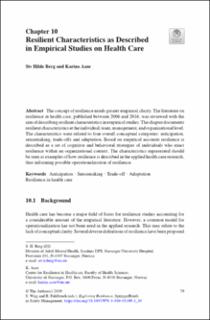Resilient Characteristics as Described in Empirical Studies on Health Care
Chapter
Published version
Permanent lenke
https://hdl.handle.net/11250/2740072Utgivelsesdato
2018-12Metadata
Vis full innførselSamlinger
Originalversjon
Berg, S.H., Aase, K. (2018) Resilient Characteristics as Described in Empirical Studies on Health Care. I: S. Wiig & B. Fahlbruch (Red.) Exploring Resilience. A Scientific Journey from Practice to Theory. SpringerBriefs in Applied Sciences and Technology, pp 79-87. SpringerSammendrag
The concept of resilience needs greater empirical clarity. The literature on resilience in health care, published between 2006 and 2016, was reviewed with the aim of describing resilient characteristics in empirical studies. The chapter documents resilient characteristics at the individual, team, management, and organizational level. The characteristics were related to four overall conceptual categories: anticipation, sensemaking, trade-offs and adaptation. Based on empirical accounts resilience is described as a set of cognitive and behavioral strategies of individuals who enact resilience within an organizational context. The characteristics represented should be seen as examples of how resilience is described in the applied health care research, thus informing possible operationalization of resilience.

